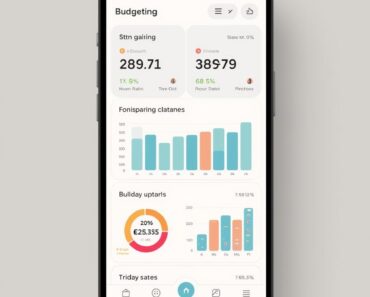Lifestyle inflation, also known as lifestyle creep, refers to the tendency to increase spending as your income rises. Although earning more money is a reason to celebrate, if your expenses rise proportionally, you might never see your savings grow or meet your financial goals. Crushing lifestyle inflation is about being intentional with your money, prioritizing savings, and making smart spending decisions that build long-term wealth rather than just temporary comfort.
This comprehensive article shares 10 genius tips to help you control lifestyle inflation, boost your savings, and secure financial freedom without sacrificing your quality of life.
1. Create Clear Financial Goals
The first step to keeping lifestyle inflation in check is defining what matters most to you. Set specific savings goals such as building an emergency fund, saving for a house, retirement, or investing. Goals give you motivation and a benchmark to say no to unnecessary spending.
-
Write down short-term and long-term goals.
-
Visualize your goals regularly to maintain discipline.
-
Break goals into monthly or weekly savings targets.
2. Automate Your Savings
Automating savings prevents lifestyle inflation by making saving effortless and consistent. Decide on a fixed percentage or amount of your income to be transferred automatically into a savings or investment account before you can spend it.
-
Use direct deposit splits or automatic transfers.
-
Treat your savings as a non-negotiable monthly expense.
-
Increase your automated savings gradually with each raise.
3. Track Every Expense
Regularly monitoring your spending is critical. Many people fall into lifestyle inflation because they stop tracking spending when income rises. Use budgeting apps, a spreadsheet, or even a notebook to log your expenses.
-
Identify patterns and pinpoint discretionary spending.
-
Track subscriptions, dining, entertainment, and “luxury” purchases.
-
Adjust habits based on real data rather than assumptions.
4. Prioritize Needs Over Wants
When tempted to upgrade your lifestyle, differentiate between needs and wants. Needs sustain your well-being; wants are optional luxuries. Avoid justifying want-based purchases with “I deserve this now that I earn more.”
-
Create a short delay (e.g., 24 to 48 hours) before large purchases.
-
Focus spending on experiences or things that add lasting value.
-
Practice gratitude for what you already have.
5. Limit Impulse Purchases
Impulse buying is a major driver of lifestyle inflation. Combat this by planning purchases, using shopping lists, and unsubscribing from marketing emails and promotional alerts.
-
Use a “cooling off” period for non-urgent buys.
-
Set a monthly discretionary spending limit using cash envelopes or a prepaid card.
-
Avoid shopping when stressed or tired.
6. Live Below Your Means
Resist the urge to match your lifestyle to your income. Living below your means means spending less than you earn, regardless of increases in salary.
-
Opt for modest housing rather than the biggest place you can afford.
-
Choose reliable but affordable cars.
-
Enjoy cost-effective hobbies that bring happiness without large expenses.
7. Review and Cancel Unused Subscriptions and Services
Subscriptions can silently drain your funds, especially as you add services to “reward” yourself after a raise. Regularly audit for services you no longer use or need.
-
Use apps or bank statements to track subscriptions.
-
Cancel or pause services to free up monthly cash flow.
-
Reallocate savings into investments or debt payments.
8. Find Joy Outside Material Things
Lifestyle inflation often stems from equating happiness with consumption. Practice finding satisfaction in free or low-cost activities, such as:
-
Nature walks, library visits, or community events.
-
Volunteering and acts of kindness.
-
Learning hobbies that enrich your mind and spirit rather than your possessions.
9. Plan for Big Purchases and Avoid Debt
Avoid spur-of-the-moment purchases of expensive items by planning and saving in advance.
-
Set up a separate sinking fund for major purchases like electronics or vacations.
-
Avoid carrying high-interest credit card balances.
-
Prioritize paying off existing debts before increasing spending.
10. Regularly Reassess Your Budget and Lifestyle
Financial planning isn’t a set-it-and-forget-it activity. Life and goals change; so should your budget.
-
Revisit your spending and saving goals quarterly.
-
Adjust allocations for changing circumstances like family growth or new priorities.
-
Share your financial goals with a trusted friend or advisor for accountability.
Why Crushing Lifestyle Inflation Matters
Many people find themselves stuck in the cycle of earning-more-spending-more, never really progressing financially despite growing incomes. The consequences of unchecked lifestyle inflation include:
-
Minimal emergency savings.
-
Difficulty funding retirement accounts and investments.
-
Increased debt and financial stress.
-
Vulnerability to unexpected expenses or income loss.
Avoiding lifestyle inflation means more freedom to choose how to live, ability to invest in future goals, and greater financial resilience.
Final Thoughts
Crushing lifestyle inflation doesn’t mean deprivation—it’s about conscious spending and smart planning. Every dollar saved can be a step closer to financial independence, early retirement, or the peace of mind of having a solid financial cushion.
Adopt these 10 genius tips one by one or all together to take control of your finances, accelerate your savings, and live well within your means while enjoying the rewards of your hard work.
If you want, I can provide SEO fields and metadata to maximize this article’s online reach.
- https://www.investopedia.com/terms/l/lifestyle-inflation.asp
- https://www.cnbc.com/select/what-is-lifestyle-inflation/
- https://www.thrivent.com/insights/budgeting-saving/what-is-lifestyle-inflation-and-how-does-it-affect-your-budget
- https://en.wikipedia.org/wiki/Lifestyle_creep
- https://www.investopedia.com/ways-to-avoid-lifestyle-inflation-11745891
- https://blog.umb.com/personal-banking-tips-what-is-lifestyle-creep/
- https://scripbox.com/pf/what-is-lifestyle-inflation/
- https://risevest.com/blog/lifestyle-inflation-how-good-habits-can-lose-their-power-when-you-overcompensate
- https://www.sims.com.gh/ghanasims/management-investment-services/news/understanding-lifestyle-inflation-and-how-to-combat-it
- https://www.no1copperpot.com/lets-talk-about-lifestyle-inflation/



